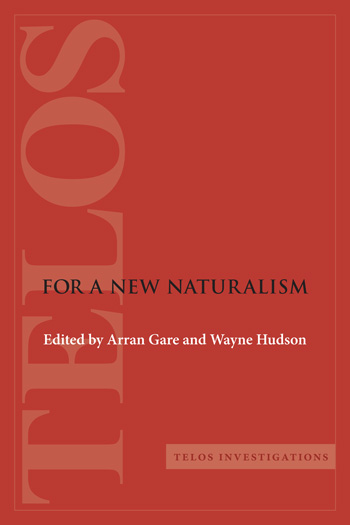
The old naturalism (nature is all there is), often called “materialism,” is now being jostled by a “new naturalism,” described in a new book, Theses on Critical Theory and Contemporary Naturalism by Wayne Hudson and Arran Gare (eds.). The publisher blurbs it thus:
The culture of modernity has been characterized by at least two competing conceptions of humans, one going back to Hobbes that strives to comprehend humans from a mechanistic perspective, and one inspired by Renaissance humanism, Vico, and Herder that sees humans as creating themselves through their history.
The first view has decisively shaped Anglo-Saxon economics but is now partially undermined by developments in physics and biology going beyond the mechanistic view of nature, notably, non-linear thermodynamics and quantum field theory. Related developments, now revolutionizing biology, provide support for a conception of humans as essentially social beings formed by, and able to reform, their cultures and their contexts. This conception of humans underpins institutionalist economics according to which humans are not self-contained egoists but behave according to the institutions in which they are situated, institutions that have evolved through history and which they are capable of transforming.
The new naturalism will be neither reductionist nor positivist. It will not be a form of scientism but should be informed by the philosophies of freedom developed by Schelling, Fichte, and Hegel and by aspects of the work of C. S. Peirce and A. N. Whitehead. This naturalism will exclude the dualisms of cultural supernaturalism and carry forward the ideals of the European Enlightenment. It will emphasize the need for a thorough critique of historical forms of religion, but it will not be hostile to post-secular perspectives on human spiritual evolution. Indeed, in the longer term it may have to consider the horizon of a global philosophical religion of the kind envisaged by the German philosopher Schelling: a philosophical religion transcending the parochialism and divisiveness of the particular religions and proving forms of ethical orientation for future sentient life.”
Hat tip: Nancy Pearcey, author of Love Thy Body: Answering Hard Questions about Life and Sexuality. She says the authors think we need more “process philosophy” (think Hegel and Schelling) to address the problems.
The old naturalism faces one really big end-stage problem: Naturalizing consciousness means eliminating the idea that it provides accurate representations of facts as opposed to being a mere adaptation for survival. That’s deadly to science.
It’s not clear that woo-woo—that no one really believes based on experience but was rather manufactured for the purpose—can long function as a solution.
View from the UD News coffee room: As process theology empties churches, process philosophy will empty classrooms. Whatever the students do, absent learning, won’t be governed by philosophy. And they won’t care.
See also: Post-modern science: The illusion of consciousness sees through itself
Follow UD News at Twitter!